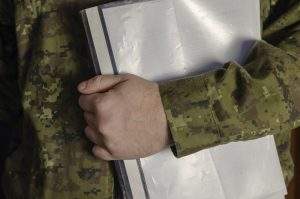John Renegar Jr., wearing a careworn baseball cap emblazed with 101st Airborne, surveyed his small living room in Smyrna Tennessee and shrugged. It just makes you think you don’t mean nothin to anybody, you know, the 66 year old Vietnam vet said. You served a country, but you dont mean anything to her.
Renegar is referring to his treatment by the Department of Veteran Affairs. Hes one of thousands of veterans to receive a bombshell of a letter in 2009 warning them that they may have been exposed to life-threatening infections as a result of misconfigured or unclean colonoscopy equipment. Hes also one of a smaller group to subsequently test positive for a serious infection in his case, chronic hepatitis that will leave him at risk for life-threatening liver damage for the rest of his life.
But Renegar was just as shaken by his treatment after the infection with the V.A. ignoring his concerns, denying his claims, and eventually fighting him in court.
Documents obtained by NBC News show he is not alone in fact, the agency has quietly rejected most of the medical malpractice claims associated with the botched colonoscopies.
Reneger said he believes he contracted his case of hepatitis during a colonoscopy at the V.A.s Alvin C. York Medical Center in Murfreesboro, Tennessee on Oct. 30, 2003. You know youve lived a clean life and hadnt done any kind of drugs or been running around on my wife or anything, he said. I dont know of anywhere else I could have got it. He was among 6,387 patients deemed at risk after procedures at that facility between April 23, 2003 and Dec. 1, 2008.
Staff at the Murfreesboro clinic first discovered the problem after seeing blood in the tubing of a water system used for irrigation during colonoscopies on Dec. 1, 2008, according to a 2009 report by the V.A.s inspector general. An investigation by the hospital determined that a required one-way valve had been absent during procedures performed that day, and that the water system tubing had not been disinfected or discarded per the manufacturers instructions.
Investigators later determined that the original valve on the water system had been replaced by one intended for use during the cleaning process, which lacked the one-way valve designed to prevent the backflow of bodily fluids into the water tube. A review panel couldnt determine when the switch occurred, according to the report so it ordered the V.A. to notify all 6,387 veterans who had undergone colonoscopies at the hospital dating back to the April 23, 2003 delivery of the equipment by the manufacturer.
Valorie Hoermann, a U.S. army veteran who served in the Middle East, worked as a physicians assistant in primary care at the Murfreesboro facility though not in the department that performed the colonoscopies. She didnt witness the problems herself, but says that they were common knowledge there. Individuals with knowledge of the procedures told her that the blood and the saline that came from another patient was going into another. She says the staff didnt speak up for one reason: Fear. Fear. Thats the only thing I can say.
The problems werent limited to Murfreesboro. A broader investigation found that medical staff at the Bruce W. Carter V.A. Medical Center in Miami also endangered patients by failing to perform required cleaning of the colonoscopy equipment between procedures from May 2004 until Feb. 12, 2009. In that case, the V.A. sent letters to 3,260 veterans warning them they could have been infected.
Sixteen other V.A. facilities reported that that they had not been compliant with colonoscopy reprocessing (cleaning) guidelines, but review panels determined that the risk of infection at those facilities was minimal and did not send warning letters to veterans, according to the report.
The V.A. did not respond to repeated interview requests from NBC News, but issued a statement saying, It is unacceptable that Veterans were exposed to harm at some V.A. facilities. When this came to light in 2009, V.A. undertook a comprehensive program that included policy implementation of new policy, standard operating procedures and additional individual training to ensure that reusable medical equipment was reprocessed properly and issues like this never happened again.
The agency has previously acknowledged that errors involving equipment and cleaning procedures may have exposed more than 10,000 veterans to viral infections. The risk resulted from a small amount of bodily fluid remaining (in the equipment) from the previous patients procedure, it said in that letter Renegar and others received, alerting them to the safety lapse.
But it claims that the problems were aberrations. It noted that in fiscal 2013, the V.A. paid only 453 medical malpractice claims nationwide out of 1,600 filed, representing a tiny percentage of the 107 million patients its medical staff saw during the year.
For the veterans exposed to the risk of infection, the agency offered precautionary blood tests. It now reports that 92 of the veterans tested positive for those viral infections 71 for hepatitis C, 13 for hepatitis B and eight for HIV, which causes AIDS.
Records obtained by NBC News through a Freedom of Information Act reveals that 76 veterans filed malpractice claims against the V.A. as a result of the lapses including 21 who subsequently tested positive for infections. The others claimed non-physical harm from the stress of knowing they were at risk.
The records also reveal a consistent response: the V.A. denied most of the claims.
Our investigation did not disclose any negligent acts or omissions by employees of the Department of Veterans Affairs acting within the scope of their employment for which the V.A. would be liable, it said in a letter informing the veterans of its decision. Accordingly, this claim is denied.
It was that move turning the veterans into legal adversaries, that hurt some the most. I think in plain language, they should have come to each of these affected soldiers and told them, this is what happened to you, says Phillip Wayne Bell, a 66-year-old former sergeant major in the U.S. Army and Army Reserves who saw combat in Vietnam, Bosnia and Iraq. He has hepatitis B contracted, he believes, from his V.A. colonoscopy. He wants the V.A. to acknowledge that its happened. And its our fault. We did it. We caused it.
Attorney Mike Sheppard, a self-described Army brat whose father and brother were combat veterans, said the V.A.s denial of the veterans medical claims defies comprehension.
After sending a letter stating that they had done something wrong and exposed them to contaminants, they send a letter out after receiving the claims (that) they did nothing wrong, said Sheppard, who represented 40 veterans who filed claims, all of which were denied. That makes no sense.
After the V.A. denied most claims filed as a result of the errors at the Murfreesboro and Miami hospitals, Sheppard said he tried to engage the V.A. in a dialogue to discuss how they could all do the right thing for all the affected veterans. When those efforts were rebuffed, he said, he filed negligence lawsuits on behalf of nine of the veterans in federal court in Tennessee, seeking significant financial awards. The V.A. response, he said, was to argue in court that no one could definitively determine whether the veterans injuries were caused by the colonoscopies.
That put the veterans in a Catch-22 situation, he said, because the V.A. refused to provide the veterans full medical records and other documentation that might enable mapping actual chains of infection.
Attorneys for the V.A. did, however, produce a schedule of exams in response to Renegars lawsuit that indicated that patients who got colonoscopies before him on the same day all were negative for hepatitis, raising doubt about the source of his infection.
In the end, the federal court in Tennessee dismissed all the lawsuits filed by veterans there, including Bells and Renegars, largely on the technical grounds of the governments arguments and the states required burden of proof for such cases.
Some veterans in Florida, which has a different burden of proof, have fared better. A federal court there awarded more than $1 million to one veteran who allegedly contracted hepatitis C during his colonoscopy, and the mans wife. The V.A. settled another lawsuit filed by a veteran who argued he was infected with HIV during his colonoscopy for an undisclosed amount. Both men underwent their procedures at the V.A. medical center in Miami.
The legal wrangling with the V.A. over their illnesses has left both Bell and Renegar with bitter feelings toward the agency, which they say has treated them as opponents, not men who risked their lives to defend their country.
You feel like youre discarded. And you feel like its all a matter of money, Bell said.
Both men say their infections have disrupted their lives in ways that have nothing to do with concern over how it might impact their health.
Both decided to abstain from sexual relations with their wives after learning they had tested positive for the disease, fearing they could infect them.
She loves me and I love her, Renegar said of his wife of 43 years, Rowena. But we just dont seem to have the real closeness that we used to have before that.





